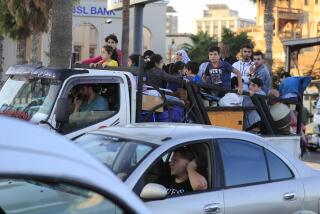Spanish Envoy Killed in Beirut : Ambassador One of 20 Slain in 18-Hour Barrage
NICOSIA, Cyprus — The Spanish ambassador to Lebanon was killed Sunday in another withering artillery exchange between Christian and Muslim gunners in beleaguered Beirut.
Pedro Manuel de Aristegui died during surgery for massive head wounds two hours after his villa in suburban East Beirut was hit by a shell, doctors at Sacre Coeur Hospital reported.
The 61-year-old envoy was one of 20 people killed in an 18-hour barrage by big guns, rockets and mortars fired by the warring sides in the fifth week of renewed sectarian conflict in Beirut.
During these weeks, marked by the heaviest continuous shelling since the Lebanese civil war broke out in 1975, at least 235 civilians and soldiers have been killed and more than 845 have been wounded.
Reports from Beirut said that the capital was covered with smoke and dust as the artillerymen ignored a proposed cease-fire set to begin at noon Sunday. Buildings were set afire in both Muslim West Beirut and the Christian eastern sector of the capital.
The Spanish ambassador was dining with his family in his three-story villa in the suburb of Hadath when the residence was struck by an artillery round at 1 p.m. He was mortally wounded, his Lebanese wife, Joumana, suffered critical shrapnel wounds and their 3-year-old son sustained minor cuts on the face, police reported.
De Aristegui’s father-in-law, Tewfik Youssef Awwad, a well-known poet, was also killed in the incident, along with a Lebanese bodyguard, according to news reports from Beirut.
“Lebanon is falling apart and with it, everything, including all human life,” lamented Nasrallah Butros Sfeir, patriarch and spiritual leader of the country’s Maronite Christian community. “Where do they want to go with this useless war? Is it to total annihilation?”
Fears for Nation
Sfeir’s counterpart among the Sunni Muslims, Sheik Hassan Khaled, echoed the Christian cleric’s alarm. “This indiscriminate shelling endangers the existence of Lebanon and the Lebanese,” he said.
The city’s fitful power supply, limited to just an hour a day for the past week, gave out completely Sunday. At the Christian port of Zouq Mkayel, north of Beirut, the main power plant for the capital ran out of fuel. An official said the turbines were shut down, and the 1.5 million Beirutis were left with only what power they could raise with small, personal generators.
Food supplies remained tight for those who dared to try to find an open market. Seaborne food imports have been blocked by shelling of the ports.
Aoun Blames Syrians
Maj. Gen. Michel Aoun, commander of the predominantly Christian Lebanese Army and head of the military government in East Beirut, accused Syrian gunners of firing the round that hit the Spanish envoy’s home, but there was no police confirmation.
Aoun’s forces triggered the current round of Christian-Muslim fighting in Lebanon on March 14 by deploying an air-and-sea blockade of ports controlled by Muslim militias, seeking to recover port revenues for his regime and to deny the militias imported weapons. Muslim forces and their Druze allies, backed by Syrian units deployed in West Beirut, answered with artillery shelling on the Christian-controlled ports.
De Aristegui was the third ambassador killed in the long-running conflict. In June, 1976, American Ambassador Francis E. Meloy Jr. was shot and killed by kidnapers in West Beirut. French Ambassador Louis de Lamar was slain by gunmen in West Beirut in September, 1981.
The Spaniard, who had served in New York at his country’s U.N. mission and as a consular official, escaped unscathed from a Shiite Muslim gunman who kidnaped him in West Beirut in October, 1984, four months after he took over the embassy in Lebanon.
He was held for three hours, apparently as a hostage for the release of two Shiites arrested in Spain for the attempted assassination of a Libyan diplomat. De Aristegui was turned over to Lebanese security officers by his kidnapers.
He was quoted as telling an interviewer recently: “If you’re afraid of death, you should leave this country.”
More to Read
Sign up for Essential California
The most important California stories and recommendations in your inbox every morning.
You may occasionally receive promotional content from the Los Angeles Times.










